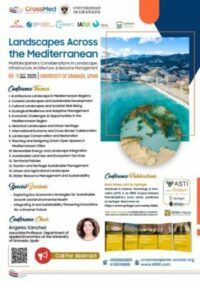ISSN (online): 2411-9660
Call of the Journal:
- Design Constraints, Solutions and Optimization in Phase Change Materials Thermal Management Systems for Space Technology and Applications
- Environmental Futures | Creative Explorations Through Science, Engineering, Design, and Art
- Integrated Strategies for Sustainable Territorial Design
- Planning for Home Renewable Energy Systems
Oct
2021
There are no untouched places left on Earth: this is what it means to live in the Anthropocene, the age shaped by human activity at an unprecedented pace. This testifies that the extent of human activity has reached top capacity in terms of radically altering the natural processes of the planet and also establishes that the environment itself is a human construction rather than a preconceived condition. It follows that the environment is inseparably merged with human construction. The very extension of space dimensions, which is a founding element for the environment, dynamically arises from any kind of interaction, either at the sociological or at the physical level. Design then emerges as a relational necessity of reshaping the dichotomy between subject and object, humanity and nature, observer and data, within a knotted texture of links and webs. This makes the environment fundamentally a design issue for a wide range of design disciplines. In this context of radical changes, in this Special Issue, we invite papers focusing on, but not limited to, design as a form of knowledge in which the term “knowledge” can no longer be ascribed to, or produced within, disciplinary boundaries, but is entirely entangled. As stated by Neri Oxman, according to Maeda’s diagram (the so-called “Bermuda Quadrilateral”), design does not act by itself anymore but is a part of the four domains of creative exploration – science, engineering, design and art – and a single individual or a project can reside in multiple dominions. Nowadays for instance within this entanglement of disciplines the emergence of artificial intelligence (AI) and its progressively wider impact on many sectors including design need to be assessed at the extent to which AI might impact aspects of sustainable development. To investigate the principles of these complementary and intertwined systems, including on their social and environmental sustainability is the general goal of this Special Issue. Studies from a wide range of design disciplines using an interdisciplinary or transdisciplinary approach, collaborative and comparative research, and systematic reviews of creative design thinking, including successful cases that demonstrate possibilities to challenge the paradigm of sustainable way of living our planet, are particularly encouraged.
Keywords: Art and engineering designs (environmental art and science); Physics and narrative environment design (physics-engineering and design); Ethnography (culture) and technology (anthropology and technology); Environmental threat and nature-based design (bioengineering); Renewable energies and landscape design (energy engineering and landscape); Electronics engineering and media design; Architectural design and manufacturing systems (3D printing, etc.); Civil engineering and nature; Urbanism and data design; Aerospace and art and art history; Climate Change and environmental science; Artificial Intelligence and Sustainability.
Environmental Futures | Creative Explorations Through Science, Engineering, Design, and Art
There are no untouched places left on Earth: this is what it means to live in the Anthropocene, the age shaped by human activity at an unprecedented pace. This testifies that the extent of human activity has reached top capacity in terms of radically altering the natural processes of the planet and also establishes that the environment itself is a human construction rather than a preconceived condition. It follows that the environment is inseparably merged with human construction. The very extension of space dimensions, which is a founding element for the environment, dynamically arises from any kind of interaction, either at the sociological or at the physical level. Design then emerges as a relational necessity of reshaping the dichotomy between subject and object, humanity and nature, observer and data, within a knotted texture of links and webs. This makes the environment fundamentally a design issue for a wide range of design disciplines. In this context of radical changes, in this Special Issue, we invite papers focusing on, but not limited to, design as a form of knowledge in which the term “knowledge” can no longer be ascribed to, or produced within, disciplinary boundaries, but is entirely entangled. As stated by Neri Oxman, according to Maeda’s diagram (the so-called “Bermuda Quadrilateral”), design does not act by itself anymore but is a part of the four domains of creative exploration – science, engineering, design and art – and a single individual or a project can reside in multiple dominions. Nowadays for instance within this entanglement of disciplines the emergence of artificial intelligence (AI) and its progressively wider impact on many sectors including design need to be assessed at the extent to which AI might impact aspects of sustainable development. To investigate the principles of these complementary and intertwined systems, including on their social and environmental sustainability is the general goal of this Special Issue. Studies from a wide range of design disciplines using an interdisciplinary or transdisciplinary approach, collaborative and comparative research, and systematic reviews of creative design thinking, including successful cases that demonstrate possibilities to challenge the paradigm of sustainable way of living our planet, are particularly encouraged.
Keywords: Art and engineering designs (environmental art and science); Physics and narrative environment design (physics-engineering and design); Ethnography (culture) and technology (anthropology and technology); Environmental threat and nature-based design (bioengineering); Renewable energies and landscape design (energy engineering and landscape); Electronics engineering and media design; Architectural design and manufacturing systems (3D printing, etc.); Civil engineering and nature; Urbanism and data design; Aerospace and art and art history; Climate Change and environmental science; Artificial Intelligence and Sustainability.
DOAJ, Inspec (IET), Norwegian Register for Scientific Journals, Series and Publishers, Scopus, CLOCKSS (Digital Archive), e-Helvetica (Swiss National Library Digital Archive), Academic OneFile (Gale/Cengage Learning), Google Scholar, ProQuest Central (ProQuest), Science In Context (Gale/Cengage Learning).
Info at: www.mdpi.com/journal/designs/ap
Guest Editor
Dr. Tiziano Cattaneo
Co-Guest Editors
Dr. Emanuele Giorgi
Dr. Antonino Marciano
Dr. Minqing Ni
Prof. Dr. Filippo Fabrocini










